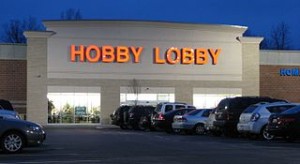[dc]A[/dc] federal court has ruled that a Christian owned-and-operated company must provide insurance coverage for the “morning after pill” and “week after pill” or face a fine $1.3 million dollars per day.
Hobby Lobby is an Oklahoma City-based arts and crafts chain that its owners, David and Barbara Green, view as a ministry and run in accordance with their evangelical Christian faith. They provide chaplains and spiritual counseling for employees, Christian reconciliation for workplace disputes, take out religious ads on Christmas and Easter, and do not carry products inconsistent with their faith. They are also against “abortion” pills such as Plan B. The Health and Human Services (HHS) mandate would force them to cover those drugs for free.
According to the Hobby Lobby website, “[t]he foundation of our business has been, and will continue to be strong values, and honoring the Lord in a manner consisten t with Biblical principles.”
t with Biblical principles.”
Hobby Lobby sued, claiming that the government cannot force religious believers to give up their faith as a cost of doing business. The government’s argument is that once a person starts a “secular” business, he or she loses the right to run that business in a religious way in violation of generally applicable laws. HHS has indicated a willingness to accommodate certain non-exempt religious organizations, but not for employers it views as secular.
U.S. District Court Judge Joe Heaton did not question the sincerity of the Green family’s religious beliefs, but ruled that these beliefs were only “indirectly” burdened by the HHS mandate. In the ruling, Heaton wrote, “Plaintiffs have not cited, and the court has not found, any case concluding that secular, for-profit corporations such as Hobby Lobby and Mardel have a constitutional right to free exercise of religion.”
In contrast, advocates for HHS and women’s health argue that Hobby Lobby does not have the right to impose its beliefs on its employees by demanding an exception in the law.
Hobby Lobby is appealing the ruling. Ultimately, for the Greens, it may come down to the question of whether a business can serve both “God and mammon.” (Matthew 6:24).
Founded in 1972, Hobby Lobby operates more than 500 stores in 41 states and employs more than 13,000 full time employees who would be eligible for health insurance coverage.
Case briefs and legal documents are available at the Becket Fund website.